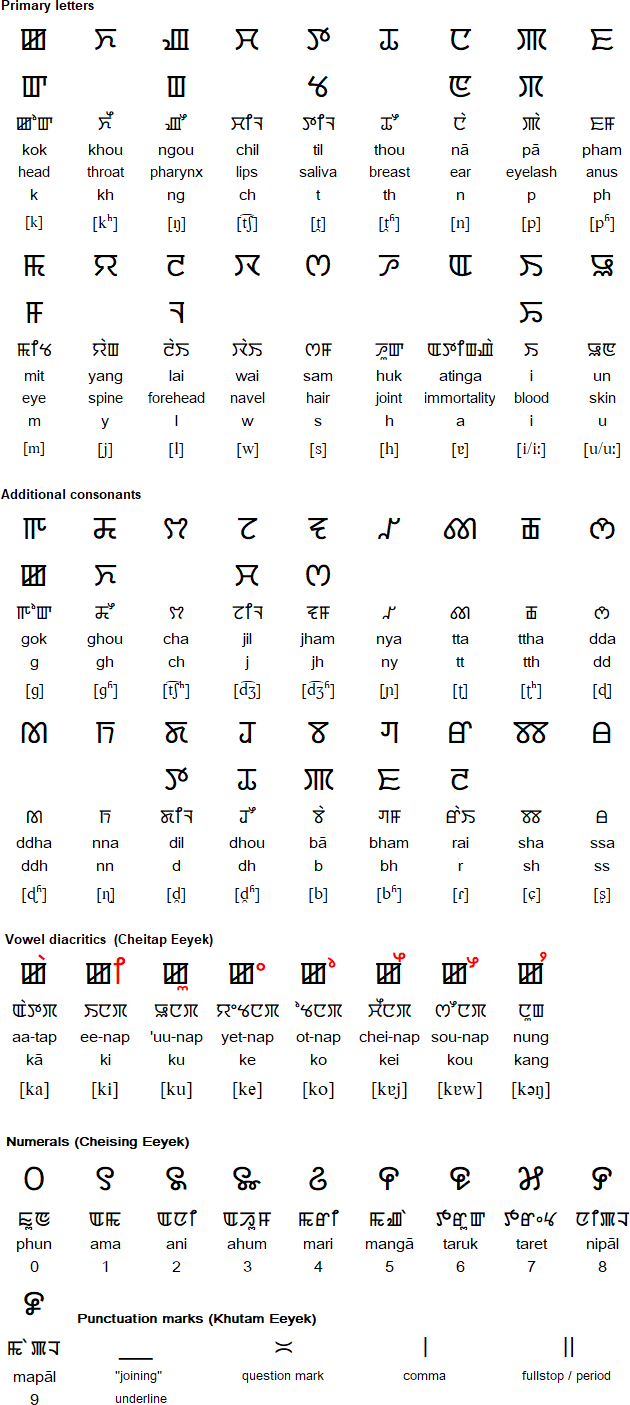The Meitei Script first appeared in the 6th Century AD on coins and copper plate inscriptions. It was used until the 18th century to write Manipuri, which is also known as Meitei, a member of the Kuki-Chin-Naga branch of the Tibeto-Burman language family spoken mainly in Manipur in the northeast of India, where it is an official language.
In the 18th century, the Meitei script was replaced by the Bengali alphabet for writing Manipuri. During the 1940s and 50s, Manipuri scholars began campaigning to bring back the old Manipuri alphabet. In 1976 at a writers conference all the scholars agreed on a new version of the alphabet containing a number of additional letters to represent sounds not present in the language when the script was first developed. The current Meitei script is a reconstruction of the ancient Manipuri script.
Since the early 1980s a modernized version of the Meitei script alphabet as been taught in schools in Manipur, and education through Manipuri is available in schools and universities in Manipur.
The Meitei script is also known as Meitei Mayek (ꯃꯩꯇꯩ ꯃꯌꯦꯛ),the Meetei script (ꯃꯤꯇꯩ ꯃꯌꯦꯛ / Meetei Mayek), Kanglei script (ꯀꯪꯂꯩ ꯃꯌꯦꯛ/ꯀꯪꯂꯩ ꯏꯌꯦꯛ - Kanglei Mayek/Kanglei Iyek) or the Kok Sam Lai script (ꯀꯣꯛ ꯁꯝ ꯂꯥꯏ ꯃꯌꯦꯛ - Kok Sam Lai Mayek).
The Meitei script is or was used to write a number of other languages, such as Chiru and Rongmei

Download a script chart for Meitei (Excel)
Learn how to write the Manipuri letters:
ꯃꯤꯑꯣꯏꯕ ꯈꯨꯗꯤꯡꯃꯛ ꯄꯣꯛꯄ ꯃꯇꯝꯗ ꯅꯤꯡꯇꯝꯃꯤ, ꯑꯃꯗꯤ ꯏꯖꯖꯠ ꯑꯃꯁꯨꯡ ꯍꯛ ꯃꯥꯟꯅꯅ ꯂꯧꯖꯩ ꯫ ꯃꯈꯣꯏ ꯄꯨꯝꯅꯃꯛ ꯋꯥꯈꯜ ꯂꯧꯁꯤꯡ ꯁꯦꯡꯏ, ꯑꯐ ꯐꯠꯇ ꯈꯪꯏ, ꯑꯗꯨꯅ ꯑꯃꯅ ꯑꯃꯒ ꯂꯣꯏꯅꯕ ꯃꯇꯝꯗ ꯃꯆꯤꯟ ꯃꯅꯥꯎꯒꯨꯝꯅ ꯂꯣꯏꯅꯒꯗꯕꯅꯤ ꯫
míːójbə kʰud̯íŋmək pókpə mət̯ə̀md̯ə níːŋt̯ə̀mmi, əməd̯i iːdʒət əməʃùng hə́k màːnənə lɐ̀jdʒɐ̀j. məkʰój púmnəmək wakʰə̀l lə̀wʃiŋ ʃèŋi, əpʱə̀ pʱə́ːt̯ə kʰə́ŋi, əd̯unə əmənə əməgə lòjnəbəd̯ə mət͡ʃìn mənáwgùmnə lójnəgəd̯əbəni'.
Mioiba khudingmak pokpa matamda ningtammi amadi ijjat amasung hak mānnana leijei, makhoi pumnamak wākhal loushing shengi, apha phatta khangi, aduna amana amaga loinabada machin manāogumna loinagadabani.
All human beings are born free and equal in dignity and rights. They are endowed with reason and conscience and should act towards one another in a spirit of brotherhood.
(Article 1 of the Universal Declaration of Human Rights)
Information about the Manipuri scripts and pronunciation compiled and corrected by Wolfram Siegel and Athouba Chingakham.
Information about Manipuri | Manpuri script (Modern) | Manpuri script (Old) | Meetei Yelhou Mayek | Phrases | Numbers
Information about the Meitei script
https://en.wikipedia.org/wiki/Meitei_script
https://en.wikibooks.org/wiki/Modern_Meitei
https://en.wikipedia.org/wiki/Meitei_script_movement
https://www.endangeredalphabets.net/alphabets/meitei-mayek/
Ahom, Aima, Arleng, Badagu, Badlit, Basahan, Balinese, Balti-A, Balti-B, Batak, Baybayin, Bengali, Bhaiksuki, Bhujimol, Bilang-bilang, Bima, Blackfoot, Brahmi, Buhid, Burmese, Carrier, Chakma, Cham, Cree, Dehong Dai, Devanagari, Dham Lipi, Dhankari / Sirmauri, Ditema, Dives Akuru, Dogra, Ethiopic, Evēla Akuru, Fox, Fraser, Gond, Goykanadi, Grantha, Gujarati, Gunjala Gondi, Gupta, Gurmukhi, Halbi Lipi, Hanifi, Hanuno'o, Hočąk, Ibalnan, Incung, Inuktitut, Jaunsari Takri, Javanese, Kaithi, Kadamba, Kamarupi, Kannada, Kawi, Kharosthi, Khema, Khe Prih, Khmer, Khojki, Khudabadi, Kirat Rai, Kōchi, Kodava Lipi, Komering, Kulitan, Kurukh Banna, Lampung, Lanna, Lao, Lepcha, Limbu, Lontara/Makasar, Lota Ende, Magar Akkha, Mahajani, Malayalam, Meitei (Modern), Manpuri (Old), Marchen, Meetei Yelhou Mayek, Meroïtic, Masarm Gondi, Modi, Mon, Mongolian Horizontal Square Script, Multani, Nandinagari, Newa, New Tai Lue, Ojibwe, Odia, Ogan, Pahawh Hmong, Pallava, Phags-pa, Purva Licchavi, Qiang / Rma, Ranjana, Rejang (Kaganga), Sasak, Savara, Satera Jontal, Shan, Sharda, Sheek Bakrii Saphaloo, Siddham, Sinhala, Sorang Sompeng, Sourashtra, Soyombo, Sukhothai, Sundanese, Syloti Nagri, Tagbanwa, Tai Noi, Takri, Tamil, Tanchangya (Ka-Pat), Tani, Thaana, Telugu, Thai, Tibetan, Tigalari, Tikamuli, Tocharian, Tolong Siki, Vatteluttu, Warang Citi
Page last modified: 19.11.24
[top]
You can support this site by Buying Me A Coffee, and if you like what you see on this page, you can use the buttons below to share it with people you know.

If you like this site and find it useful, you can support it by making a donation via PayPal or Patreon, or by contributing in other ways. Omniglot is how I make my living.
Note: all links on this site to Amazon.com, Amazon.co.uk
and Amazon.fr
are affiliate links. This means I earn a commission if you click on any of them and buy something. So by clicking on these links you can help to support this site.
[top]